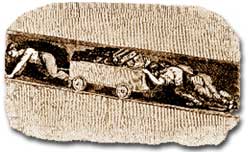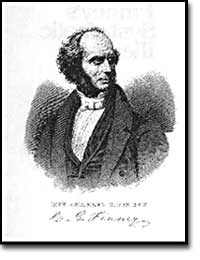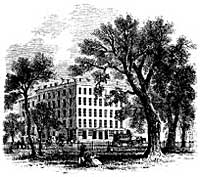22d. Institutionalizing Religious Belief: The Benevolent Empire

Children worked in the coal mines during the beginning of the Industrial Revolution in Britain.
The breadth and success of the Second Great Awakening meant that it had multiple dimensions. Its origins in the 1790s had been especially radical and included strong commitments to anti-slavery among Methodists and Baptists. This radicalism quickly passed and even its populist elements tended to fade, or was most fully expressed in more egalitarian western locations. In urban areas the social movement also had a major impact, but here it tended to have a more conservative and institutional character that grew from the increasing distance between rich and poor created by the rapid economic growth of the early Industrial Revolution.
At the heart of this aspect of the Second Great Awakening was a religious commitment to social reform by elite and middle-class urban dwellers. Motivated by a concept of religious benevolence that encouraged them to try and improve the condition of spiritually impoverished people, these religious reformers created a national network of religious institutions in the decade after 1815. Although typically headquartered in the major cities of the northeast, groups like the American Bible Society, American Sunday School Union, and the American Tract Society, were among the very first institutions to organize on a national scale.

Charles Finney, seen here in 1846, is credited as one of the most influential theologians of the Jacksonian era. He was one of the first religious leaders in America to denounce slavery, helping the creation of the abolitionist movement.
These institutions cooperated on an interdenominational basis to form what is often called the Benevolent Empire. Leaders of these organizations hoped to overcome the great pluralism within American Protestantism by downplaying denominational differences in favor of promoting a general Christian vision that would support national greatness and individual moral reform, causes which they believed to be deeply intertwined.
Among the most famous leaders of the Second Great Awakening was a Presbyterian minister named Charles Grandison Finney who led a series of revivals in the newly developed areas along the Erie Canal in upstate New York. His work climaxed with a six-month campaign in Rochester in 1830 where he preached daily and developed important new techniques such as group prayer meetings within family homes. He also relied centrally on women, including his wife Lydia, as key forces in drawing others to convert.

The 1825 headquarters of the American Tract Society, an organization devoted to spreading the Good Word.
Finney's efforts in Rochester, like the work of the Benevolent Empire more generally, had its greatest impact among business leaders and middle-class people who had benefited from the increased standard of living brought about by the early Industrial Revolution. These groups recognized the rewards to be secured from hard work and self-discipline which they combined with a commitment to Christian morality that often included strong opposition to drinking alcohol.
On the other hand, for unskilled workers, who were largely excluded from the benefits of the Industrial Revolution, the new call for moral reform seemed to intrude on private family matters. Instead of seeing religion as the answer to social problems, some opponents of the Benevolent Empire began to call for workingmen's associations that could secure higher wages for ordinary laborers. The gulf between Protestant reformers and common laborers was especially great when those workers were Irish Catholics who entered the United States in large numbers starting in the 1830s.
Religious clashes were not far off.







